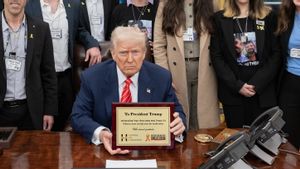JAKARTA - The global shortage of chips has further led four of the largest US car and truck sellers to say their sales have fallen recently.
These events prove the strong pressure that the global semiconductor shortage has caused the automotive industry to slump sharply. General Motors (GM), Honda, Nissan and Stellantis reported significant sales declines in the three months ended September.
In GM's case, the company was down by a third from the previous year. The shortage of chips has forced them to cease factory operations, leaving dealers with few vehicles to sell.
Compiled from the NYTimes Monday, October 3, GM sold only 33 percent fewer cars in Q3 2021 than it did in Q3 2019, totaling 446,997 units this year compared to 665,192 last year. Meanwhile, in Q3 2020 it only fell 13 percent from sales in Q3 2019.
GM is known to have been the biggest seller of vehicles in the US every year since passing Ford in 1931. With these sales figures, it seems that GM's crown which it has achieved for 90 years, has to be lost due to the COVID-19 pandemic and defeated by Toyota.
Japan-based Toyota saw a slight increase for the quarter of around 1 percent with 566,005 units sold, but sales in September fell sharply 22 percent from a year ago after being forced to cut global production due to a chip shortage and other disruptions to its spare parts supply due to the pandemic. COVID-19.
"We are in uncharted waters. We've never seen a shortage of vehicles like this. There aren't enough cars to sell," said Haig Partners president and automotive consultancy, Alan Haig.
Semiconductor shortages began as the pandemic began, when automakers around the world closed factories for weeks and suddenly cut their orders for computer chips.
At the same time, manufacturers of laptops, game consoles, and other electronics are demanding more chips as sales of their products increase as more consumers stay at home. However, when automakers want to resume production, chipmakers have far less production capacity to allocate to automotive chips.
Strong auto sales, driven in part by the government's economic recovery program, helped prop up consumer spending during the first year of the pandemic. But now production delays and depleted inventories are hampering sales as waning government support and the emergence of the Delta variant of the coronavirus as new drags on consumer spending.
The English, Chinese, Japanese, Arabic, and French versions are automatically generated by the AI. So there may still be inaccuracies in translating, please always see Indonesian as our main language. (system supported by DigitalSiber.id)













